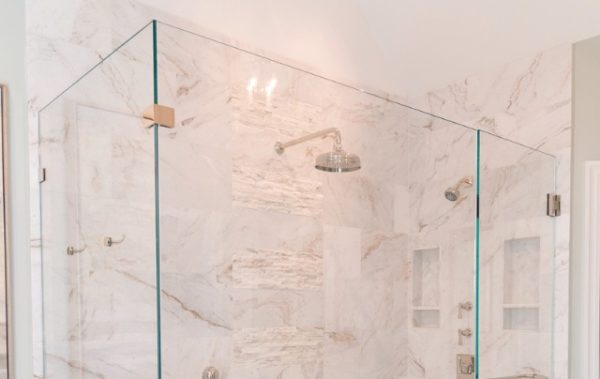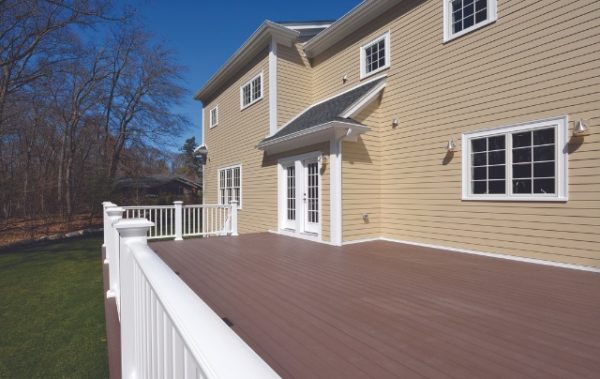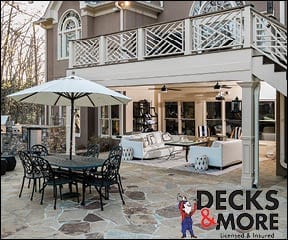How to get your pool ready for summer

With the mercury barely rising above freezing this month, lounging by the pool is probably the last thing you’re thinking about right now. (Or maybe it’s the only thing you’re thinking about!)
Either way, the time to plan your long, hot days by the pool is now. We’ve gathered some helpful advice from the experts to help you start making your summery pool-related plans, whether you’re ready to have a new pool installed or need to find the best way to maintain or upgrade the one you already have. So grab an umbrella drink and get ready to ask yourself some important questions about creating the pool of your dreams.
What Kind of Pool Do I Want?
Above ground vs. in-ground
Above ground pool or in-ground pool? That is the question. “Above ground pools are a lower cost option to get water in the backyard, and although a good quality pool can last a long time, these are often more of a temporary installation,” says Evan Horning, partner and director of sales for Neptune Pools, Inc.
While some homeowners may consider an above ground pool installation to be a DIY project, professional installation is available and recommended, especially since proper permits and fencing are still required for this option.
Of course, an in-ground pool requires professionals and is a more permanent alternative. It will also become an integral part of your landscape design so you need to decide how much you want to transform your backyard living space.
Chlorine vs. saltwater
This one’s actually a trick question. “This is one of the most common misconceptions that I come across when I speak with potential clients,” explains Brad Renken, Assoc. AIA, CBP, owner and founder of Hearthstone Environments, LLC. “Saltwater pools are technically chlorine pools. The key difference is in the way that the chlorine, which is the sterilizing agent, gets added to the water.”
A saltwater pool employs a generator to break down the salt molecules into sodium and chlorine. According to Horning, the process provides a constant and uniform application of chlorine to the pool while saving on chemical costs. Renken adds that a saltwater pool is safer for children and pets because there are fewer toxic chemicals to store. As an added bonus, a salt system tends to be easier on the eyes, skin and hair.
Concrete vs. vinyl liner vs. fiberglass
The key to this decision involves the amount of customization you want for your pool. “If someone just wants a good recreational pool, a vinyl lined or fiberglass pool may be a good choice,” Horning notes. Vinyl liners are the least expensive, Renken says, yet they require more maintenance, are the most fragile and have designs limited by templates; fiberglass also is limited in terms of design choices but can be installed quickly and is fairly durable.
Concrete pools are the most expensive, but the options are plentiful. He continues, “Concrete pools are, on average, the most costly up front, but they can be custom designed and custom built, have high durability and are the most aesthetically flexible. We believe that concrete pools are also the most attractive.” In addition, Horning points out that concrete pools can feature attached spas, grottos, sun ledges, vanishing edges, raised or exposed pool walls and more.
How Can I Make the Surrounding Patio Stand Out?
These days, the pool itself is just part of the overall design. The deck or patio is equally important—not only for aesthetics, but also for function. “Some things to consider when choosing a deck material are whether or not it will be hot to walk on with bare feet, if it is prone to cracking and if it needs to be sealed,” Horning says. Two of the most common materials used today are pavers and concrete.
Pavers
According to Horning, pavers, which are made of sand, come in a variety of shapes and styles and provide a very durable finish. Of course, pavers can settle and move over time if not installed correctly; also, the sand that holds them together can get into the pool and be difficult to get back out.
Concrete
Concrete is another popular option. Renken prefers stamped concrete in particular because it provides a high-end look. And while concrete can—and often does—crack, SUNDEK coating can help immensely. The decorative concrete coating makes concrete slip-resistant, cooler on the feet and easy to maintain; it’s also a cost-effective choice that will allow you to repair and update old concrete.
So How Hard is it to Keep a Pool Clean?
“Pools have come a long way over the years, and although they aren’t quite maintenance free just yet, they don’t have to be a burden either,” Horning observes. “As with anything else, proper maintenance and preventative care can provide a pool that will give you and your family years of enjoyment.” And that begins with the cleaning process.
Manual cleaning vs. automatic cleaning
“As a former lifeguard, I will do anything to get out of vacuuming a pool manually,” Renken muses. While time consuming, traditional pool vacuums do have their place in the cleaning process. In fact, they actually can be perfect for quick cleaning needs, given the right circumstances. “If you’re getting ready for a party and a storm blows through, the automatic cleaner may not be fast enough to get the pool clean,” Horning notes. “That’s where the old school pool vacuum comes in handy.”
Of course, an automatic cleaning system is ideal. “Automatic systems are great for keeping a pool clean,” Horning adds. There are many options available—some which work best for newly constructed pools and others that are great for existing pools. Horning recommends researching your options based on the pool you have. Renken suggests considering an in-floor cleaning system. “An in-floor cleaning system consists of a series of mechanical water jets (similar to a sprinkler head) strategically placed throughout the pool, which keep water moving so that dirt and debris can be pulled out through the main filter,” he explains. “These in-floor cleaning systems can eliminate up to 90 percent of the everyday cleaning maintenance of owning a pool, but they come at a high price tag.” Be prepared to spend between $5,000 and $8,000 depending on the size of your pool.
Can I Update My Existing Pool?
An in-ground pool is a pretty permanent feature, but it doesn’t mean it has to stay the same as it’s always been. Upgrading your pool is possible as long as you keep some things in mind. “My best advice for updating an existing pool is not to be penny wise and pound foolish,” Horning suggests. “Cutting corners to save a little money can often cost more in the long run.”
Fix what’s there
According to Renken, once you check to make sure that your concrete pool is structurally and mechanically sound, you should replace the water-line tiles to give it a facelift. “To add a touch of luxury, consider using glass tile in your design,” he says. He also recommends upgrading to a Pebble Tec finish, which can provide a natural and artistic look. You can even upgrade your pool’s coping using contemporary materials like flagstone, pattern concrete or travertine.
Add new features
To give a pool a new look and feel, Renken has added everything from raised spas and spillover water features to benches and sun shelves. The possibilities are virtually endless. And if you’re upgrading the aesthetics of your pool, don’t forget how it works as well. Horning recommends updating your pool equipment too. He says, “It is more cost effective to replace everything together and get new warranties rather than to keep paying for service calls just to keep things running.”
Budget Breakdown
So how much does owning a pool really cost? From installing to maintaining this coveted backyard feature, you need to keep some facts and figures in mind as you make your pool-related decisions. Here, Evan Horning of Neptune Pools, Inc., and Brad Renken of Hearthstone Environments, LLC, offer up some numbers to consider as you move forward with your pool plans.
Size
Pools commonly are between 30 and 40 feet long, or between 500 and 700 square feet.
Installation Costs
The price of building an “average” sized pool varies greatly based on the features and materials used. An in-ground concrete pool can begin at $40,000 or $50,000 and go as high as $140,000 or more. For instance, including features like a spa or a heater can add $12,000 to $15,000 to the final cost.
Maintenance Costs
If you bring in a professional service to clean your pool, expect to pay between $50 and $70 per visit. If you purchase your own equipment and clean the pool yourself, the costs can vary. In fact, with the advancements in technology, equipment options—and prices—change often. Do your research before purchasing any items.
Energy and Water Bill Costs
Again, the size of your pool will determine how much of a hit your bills will take in terms of energy and water usage. On average, though, the cost of water to keep your pool filled is minimal, and energy usage costs around $40 to $60 per month. Those numbers will increase based on whether or not you need systems to run water features as well.
Other (Possibly Unexpected) Costs
When you add a pool to your home, your homeowner’s insurance rates undoubtedly will go up, so check with your insurance company. You also need to include fencing and landscaping for the pool area in your budget plans.
Shape Up
The shape of your pool can be a direct reflection of your personality, as well as the architecture of your home.
In fact, the options are limitless—especially when you choose a customizable concrete pool. Just be sure to keep in mind what you plan to do with the pool, Brad Renken notes. Do you want to swim laps for exercise? Choose a simple shape and don’t put benches or steps in your path. Do you want to include a spa in the design? Make sure it’s easy to access from your back door (instead of on the other side of the yard). Do you plan to sunbathe? Consider adding tanning ledges to the design. According to Evan Horning, your designers will be able to provide you with excellent guidance.
RESOURCES
Hearthstone Environments, LLC| HSEnviro.com
Landscape Studios| LandscapeStudioGroup.com
Satori Homes| SatoriHomes.com
Selective Designs| SelectiveDesigns.com
Neptune Pools, Inc.| NeptunePools.com [embed:fc:field_portfolio:1610:fc_portfolio_node_embed]

Ditch Mold With a Frameless Glass Enclosure


November 2012 Garden Planner
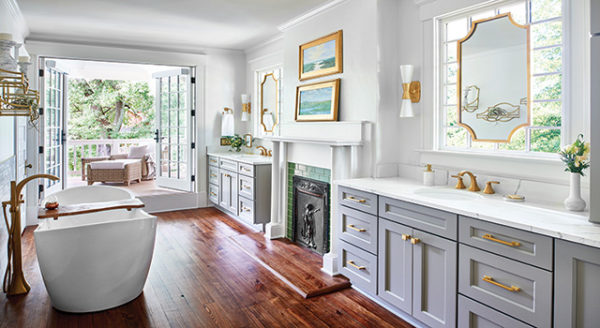
Award-Winning Kitchens, Baths, Interior Design and More
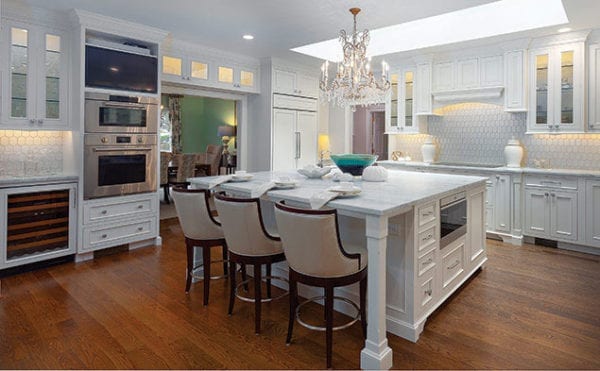
Atlanta’s NKBA Designs of Distinction 2019 Winners

100 Things to Know Before You Remodel
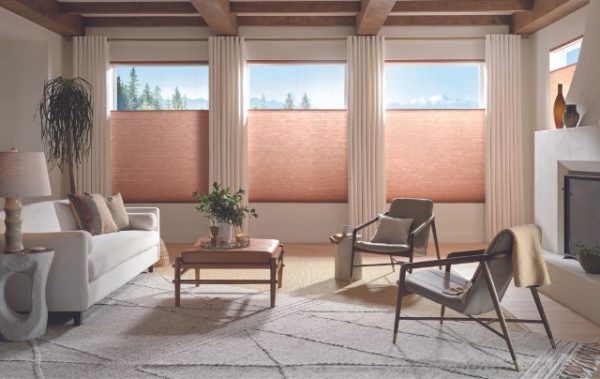
What’s the simplest way to upgrade your window treatments?
